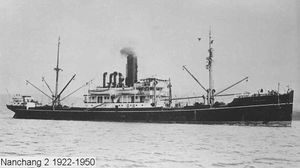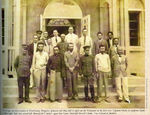Nanchang II
Sister of the ship Newchwang II
Contents
History
May 1st. 1950. Along with the Ninghai I at Hong Kong awaiting scrapping by Wing Tak, Kowloon.
Service
Built for the Shanghai - Weihaiwei - Newchwang - Tieintsin - Dairen service.
Events / Stories
The Manchurian Affair
At dawn on a chilly March morning in 1933, the China Navigation Company’s 2,480-ton coaster Nanchang rode at anchor in the estuary of the Liao River, awaiting a pilot to take her the nineteen miles upriver to Newchwang, the old beancaking port on the Gulf of Liao-Tung in northeastern Manchuria.
Just a year and half before, the Japanese Army had invaded the province, establishing the “independant” state of Manchoukuo under the puppet leadership of the deposed playboy Emperor, Henry Pu-Yi. The Nationalist forces had fled, leaving a few stragglers to scratch a living from the bleak landscape as outlaws. The once thriving foreign community had dwindled to a handful and the trappings of European life on the China coast - the tennis club and the golf course - had fallen into disrepair.
Foreign flag shipping calling at this faded outport continued to go about its business unmolested, however: only the South China Sea was notorious for piracy.
The six British officers and 37 Chinese crewmen on Nanchang were thus caught off guard when two seemingly-innocent fishing junks amongst the many dotted about the peaceful landscape, suddenly swept alongside, disgorging a motley assortment of armed pirates, who swarmed on deck firing indiscriminately. Within minutes they had rounded up the ship’s complement at gunpoint - missing only the Master, Captain Robinson, who had barricaded himself in his cabin and the Chief Engineer, who hid in the engine-room.
Fearing help might be on its way, the pirates quickly looted the cabins of anything they could carry away and returned to their junks - taking with them the four remaining British officers. The attack lasted twenty minutes. Its after-effects were to last five long months and the Nanchang incident was to become the most celebrated piracy the China coast had ever known.
The shallow-draft junks soon vanished over the sand bar and into the dense jungle of reeds fringing the river estuary, where no ship could pursue. The Nanchang’s captain could only radio news of the attack to Newchwang and limp into port as best he could.
First Officer Clifford Johnson, Second Officer William Ewart Hargrave, Second Engineer Archibald Duncan Blue, and Third Engineer Frederick Lockie Pears had meanwhile spent the day battened down in a noisome coffin-shaped locker, in which they could neither stand nor lie down. Finally, the chief pirate dropped down into the hold to survey his prize. Since there was no room to do otherwise, he sat down on their outstretched legs.
Hsin-Chun was a deserter from the Manchukuo Army. Over the tattered remains of his uniform he wore Johnson’s overcoat and wristwatch. He spoke no English, but indicated in pantomime that he wanted ransom money and pointed a revolver at the head of each officer in turn to show what would happen if no money came.
It was an accepted fact of life on the China Coast that no foreign power would pay ransom money for its subjects. To do so would open the floodgates to banditry and no foreign national would be safe from kidnap. The four Nanchang officers knew their best chance of survival lay in escape and three nights later, their moment came. By day, the hostages were allowed on deck for short periods; by night, they were locked into what they came to call their “Glory Hole” with a couple of filthy dogskins as their only source of warmth. The pirates did not bother to set a watch at night: it did not occur to them that their captives would try to escape across the freezing, muddy desert that surrounded them as far as the eye could see. A carelessly bolted hatch cover seemed a good omen, and at dead of night, Johnson, Hargrave, Blue and Pears slid over the side of the junk and onto the mud.
With no moon, they quickly they lost all sense of direction, but for several hours they struggled on, sometimes sinking thigh deep into the slime. By now the tide was on the turn and water was coming in fast. Their choice was stark: return to the junk, or drown in the tidal delta. They began to retrace their fast-disappearing footprints. At dawn, they just made out the junk’s hull against the lightening sky and exhausted, crept back into the welcome confines of their “Glory Hole”. Their kidnappers had slept through the entire adventure.
The following day came a new development: the pirates had decided to send one of the hostages to Newchwang with a ransom demand. Trembling, the four men played poker to decide who would go, using cards made from torn up cigarette packets. Blue won, but at the last minute, the pirates chose Pears. He had been captured wearing a boilersuit and they decided he was the least valuable of their prizes.
In Newchwang, Butterfield & Swire’s local agent Ian Grant had meanwhile assembled a small team, headed by Denzil Clarke, Vice-Consul, based in the capital, Mukden. The note Pears brought them was highly idealistic: the pirates wanted the expulsion of Japan from the Three Eastern Provinces, or enough arms to do the job themselves.
Its immediate effect was to bring supplies to the hostages: a Mandarin phrasebook, socks, toothpaste, adventure novels, de-lousing powder and the all-important cigarettes came their way. Chocolate, lump sugar, Wall’s pork sausages and Bovril - which they ate with chopsticks - now supplemented their meager diet of a bowl of rice and a cup of hot water a day, while the negotiating team stalled for time.
April dragged on and then a change. Without warning, the two pirate junks were attacked: the Europeans had been spotted by a rival gang. Battened below decks, the three men heard confused firing, then the hatch opened and an unknown armed Chinese dropped amongst them: the pirates had been pirated.
Their new captors were professionals. In all, there were 80 men in seven junks. Their captain, Li Wen Chi - a young man of about 30 - fiddled constantly with the Mauser pistol he had appropriated from Hsin-Chun and paraded his authority in Johnson’s dinner-jacket and Blue’s uniform cap. The ransom demands lost their political flavour: the new gang would settle for two million dollars and 200 gold rings.
The weather began to warm up and the junks moved deeper into the reeds. The mosquitoes and the lice multiplied. The three men became experts at popping lice between finger and thumb. To ease their plight, the pirates shaved their heads with a piece of glass - their white skulls an odd contrast above their heavily tanned faces.
Their Mandarin improved. Blue amused the pirates by spitting out his false teeth - a novelty in Manchuria - and taught them First World War songs. It’s a long way to Tipperary became a firm favourite. Despite these diversions, the three were left in no doubt of their fate if the ransom demands were not met. One dreadful day, they were dragged ashore to watch as a farmer, suspected of spying for the authorities, was beaten senseless. He was later taken away and shot.
May and June passed in stop-start negotiations. The British insisted the local authorities must take charge; the different political factions in Manchukuo squabbled. Then, on the 5th July, the cry “Feijin, Feijin!” went up: “Planes !”. Japanese bombers were attacking the estuary. The crew abandoned ship in a hurry. It was every man for himself and the three captives made a run for it in different directions. Shoeless, they cut their feet to ribbons on the stubble of newly harvested reeds and once more they were recaptured.
Li Wen Chi decided the water was no longer a safe refuge for his band. Now began a nightmarish two months for the hostages, as he force-marched the entire party across the countryside, tramping by night and lying up by day. Food rations were reduced to ping tzu, a hard cake made from millet flour, accompanied by filthy creek water. Roped together to prevent escape and alternately soaked to the skin by torrential rains or burned by the harsh sun, the three men were plagued by nipping land-crabs and by huge horse-flys known as “sharmuns”, with a sting like a hyperdermic needle. Hargrave’s cut feet began to ooze pus: the pirates treated them with toothpaste.
At last they reached farmland, and the relative luxury of spartan village houses to sleep in. Everywhere the bandits were made welcome; where they weren’t, the consequences for their reluctant hosts were terrible. By September, the party had completed a huge circle and reached a spot close to the start of their journey, near the town of Panshan.
Meanwhile, back in the UK, news of the affair had prompted questions in the House of Commons. Diplomatic pressure was being put on the Manchukuo authorities to end their plight and Captain Soichi Obata of the Japanese Gendarmerie had been appointed to take charge.
Out of the blue, the hostages received a visitor. A ransom was to be paid and Obata had sent a go-between, a Korean named Lee, to check that impostors had not been substituted for the three men, before any money changed hands. Soon satisfied, Lee left them with a tin of cigarettes and a promise to return soon, and later the same day, Obata orchestrated the exchange in a neighbouring village. Far outnumbered by the pirate band, the gaunt, dirty British and their Japanese rescuers waited interminably in the hot sun, whilst every bandit received his share. Perhaps there was honour amongst thieves after all ! There followed an affecting farewell: each pirate shaking his former prisoners by the hand and inviting them to “Please join us again next summer and together we will kidnap others.” Five long months of captivity were over at last.
Photo: The hostages and their rescuers at Newchwang. Hargrave, Johnson and Blue (left to right) are the Europeans in the front row. Captain Obata (in uniform) stands on Blue’s right. Back row, second left: Butterfield & Swire’s agent Ian Grant; third left: Denzil Clarke, Vice-Consul at Mukden.
December 28th. 1933. The Times received and published the following Telegram:-
Newchwang, Dec 23rd. - The deputy chieftan 0f the outlaws involved in the kidnapping of the three British Mercantile Marine officers who were for some months held prisoners at Newchang recently, was executed this morning by the Manchoukuo authorities. He was recognized when on a visit to Newchwang and arrested. Three companions were also arrested and are being sent to Mukden for trial. -- Reuter.
Further Reading.
The personal recollections of the piracy by Clifford Johnston C/O, and Archibald Blue 2/E, are described in the book "The Lion and the Dragon" by Christopher Cook.
Clifford Johnson in his book "Pirate Junk" published by Charles Scribner's Sons of New York in 1934, relates their experience of the five months with Manchurian bandits from notes which he made from scraps of paper during their captivity.




